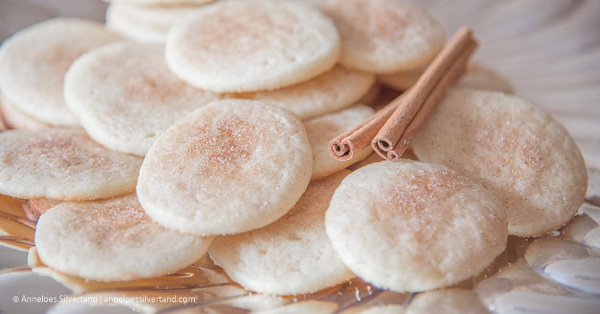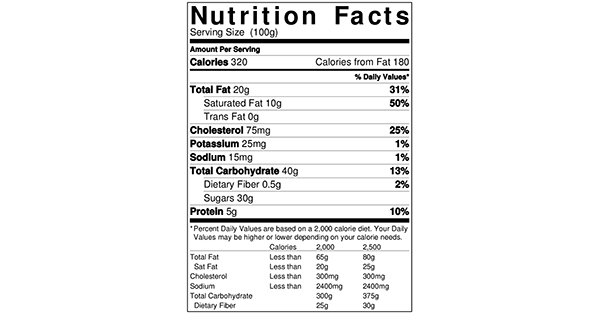These Sugar Cinnamon Cookies are perfect because of their simplicity. A simple vanilla cookie topped with a bit of cinnamon sugar. The Sugar Cinnamon Cookies can be stored for several weeks making them an ideal Cookie to serve to unexpected guests.
Before making these cookies, it is a good idea to check out my [Tips for Making Cookies] article. This will help you make the perfect cookies and could fix some problems you might have encountered, during your cookie-baking adventures!

If you have any dietary restrictions, always check the labels on the products you are using to make this recipe with. They will tell you if, for instance, your ingredient might contain traces of nuts, your products are made with dairy or if there is a chance the ingredients have come into contact with gluten-containing food or equipment.
Would you like to know more about what to look for when you are buying your products while you have dietary restrictions or preferences? Are you preparing food for someone who does? Check out my articles on [Food and Health] and learn more!
Do you like the Sugar Cinnamon Cookies recipe? Please share it or leave a comment and follow Truthful Food on social media so that you won’t miss out on anything new and delicious!
Ingredients
- 125 g Unsalted Butter
- 150 g Vanilla sugar - [Check out my recipe!]
- 1 Chicken Egg [Size L] - [See good to know section.]
- 250 g All-Purpose Wheat Flour
- Dash Ground Salt
- 30 g Cow’s Milk - [See good to know section.]
- 25 g Cinnamon Sugar - [Check out my recipe!]
Other things you need
- Food Scale
- Bowl
- Mixer
- Dinner Spoon - Ideally a silicone spatula.
- Cling Wrap
- Refrigerator
- Chopping Board
- Chopping Knife
- Parchment Paper
- Cookie Sheet - Ideally more than one.
- Pastry Brush
- Oven
- Oven Mitts
- Cooling Rack - This is optional.
Instructions
- Weigh the ingredients.
- Mix all your ingredients until it is a homogeneous mixture.
- Roll the dough till it is rod-shaped. The dough will be about 30 centimetres long.
- Wrap the dough in food wrap and put it in the refrigerator overnight.
- Take your dough from the refrigerator and put it on a chopping board.
- Cut the dough into pieces of about 5 millimetres using a sharp chopping knife. The dough-slices should be about 20 grams each. By weighing or measuring them, you can make sure all the cookies are the same size. If the cookies differ in size, there is a chance the smaller ones will burn while the bigger ones are underbaked.
- Preheat the oven to 185 degrees Celsius or 365 degrees Fahrenheit.
- Cover the cookie sheet with parchment paper.
- Put the cut cookie slices on your cookie sheet.
- Dab a little bit of water on top of each cookie using your pastry brush. You do not need to use a lot of water, just enough to make the cinnamon sugar stick.
- Sprinkle cinnamon sugar on top of your cookies.
- Bake your cookies for 10 minutes. [See good to know section.]
- Let the Sugar Cinnamon Cookies cool off a little and enjoy!
Good to know
- Storing: Make sure to store your cookies in an airtight container if you are not eating all of them right away. For crunchy cookies; a cookie tin is the best way to store your cookies. For soft cookies; keep them in an airtight container to keep your cookies soft and moist.
- Shelf Life: The cookies will stay good for over two weeks if stored correctly. If you like, you can store them in the refrigerator but make sure to take them out in time so they can return to room temperature before serving.
- Refrigerating: You can store the raw cookie dough in your refrigerator wrapped in food wrap for several days. Put it in a resealable freezer bag or airtight container to prevent it from drying out.
- Freezing: You can freeze the raw cookie dough wrapped in food wrap and stored in a resealable freezer bag or airtight container for several weeks if you do not want to bake the cookies right away. Let the dough defrost before you bake your cookies.
- Adding dry ingredients: If you have the patience, it pays off to sieve the dry ingredients while you are adding them. It will ensure you do not end up with lumps in your dough.
- Using Eggs: Make sure your eggs are still good before you use them. How? [Check out my article!]
- Butter: If your butter is very cold when you are making the dough, it is important to check if the dough is properly mixed. With very cold butter, there is a good chance you end up with lumps of pure butter in the dough.
- Dough temperature: If the dough is warm because you left it out at room temperature for a long time, the dough will run more and you will end up with flat and runny cookies.
- Cooling the dough: If you do not want to keep the dough in your refrigerator overnight, you can put it in your freezer for about an hour or until it feels solid all the way through.
- Snacking on the dough: Keep in mind that, if you are snacking on the cookie dough before you bake it, a raw egg is part of the dough. Raw eggs may contain pathogens that, after you consume them, can leave you feeling less than excited about eating some of the raw dough.
- Organic: To make this recipe organic, only use organic ingredients.
- Lactose-free: Use almond milk and butter.
- Gluten-Free: Use rice flour.
- Tip: When you are making this recipe with my recommended amounts, you will end up with 30 cookies. I suggest you either freeze part of the dough and bake that part at a later point in time or share the cookie-love with the people around you!
Nutritional Information per Portion
Know What You Eat
Both when buying food or when making your own, it is important to inform yourself about the nutritional value. Have a look at the nutrition label, learn about your serving size and what nutrients this product will bring to the table.
If you want to compare different products and their values, it is easier to look at a label where the values are given per 100 grams. This way you get a better understanding of the categories certain products belong to when it comes to nutritional values. Is this a product with a high sugar content? Does it contain a lot of fibre? How does this product measure up if I am looking to stick to a low-sodium diet?

Keep in mind that if you are looking to eat healthily, you should not just avoid eating fat and/or sugar. We need both in our daily diet. Make sure however to be aware of where you get your lipids and sugars from. As a rule of thumb, you could say; variation is very important in your diet and in general, the closer your food is to come straight from the source, the better.
If you want to read more about healthy food choices, check out my article [Healthy Food Choices]. Truthful Food also has a continuously growing article category solely focusing on specific ingredients and nutrients for everyone who wants to take a closer look at what you can find in your food.
*All given nutritional information is an indication. Due to differences in how ingredients are produced, where they are purchased and how the recipe is prepared, nutritional values may vary.
Leave a Reply